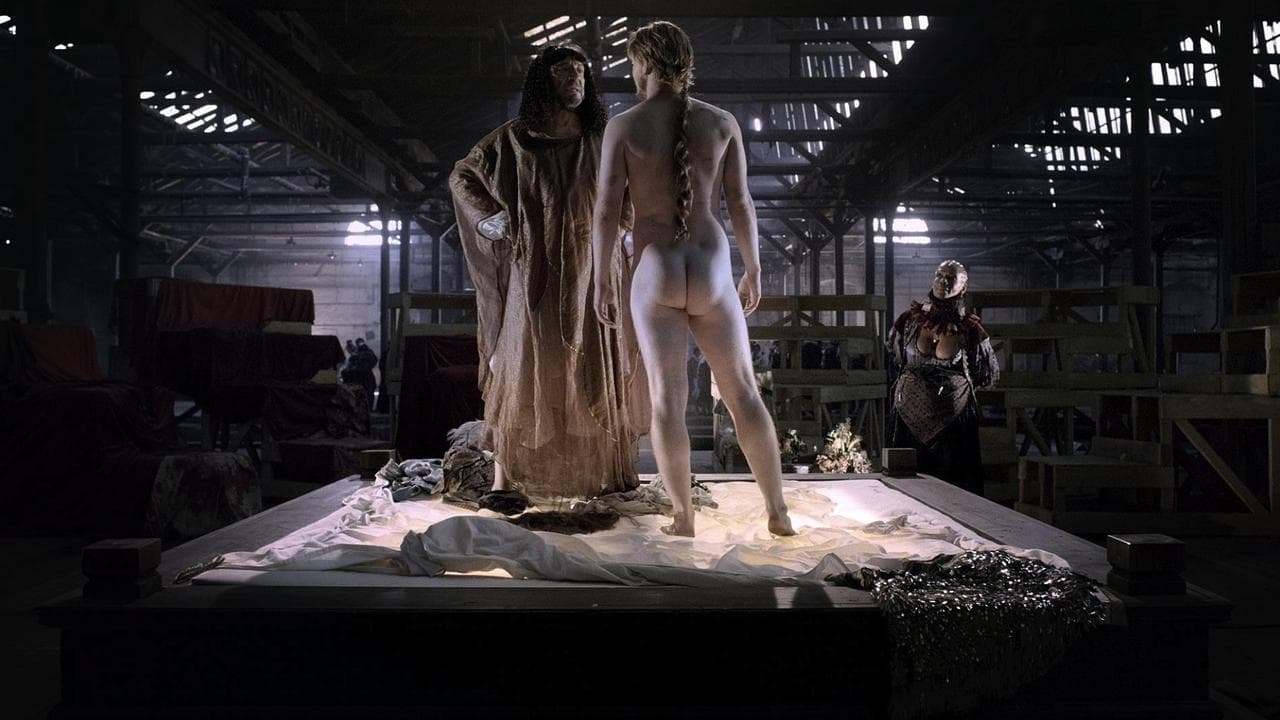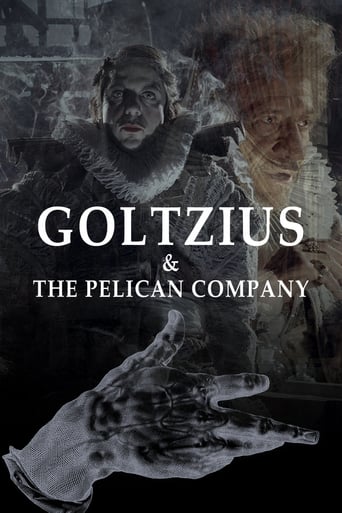

Goltzius and his pelican company are a band, or troop, of entertainers who want to set up a printing press to produce enlightening pictures of 'art', the sort of art that gets pulses racing. Well they happen upon the kingdom of The Margrave of Alsace. Where Goltzius sets out to seduce him into funding his entrepreneurial activities and make some cash into the bargain.In order to do this he is required to put on several plays of a 'Biblical' nature for the titillation of their imminent (hopefully) financier. The plays all examine the latent sexuality of the stories, and in doing so challenge the hypocrisy of the sixteenth century religious establishment. The plays lead to public debate that starts out as free speech and soon descends into anything but. In the meantime the on stage sexual displays get hotter and lewder to a point where the 'legitimate voyeurism' of the audience is replaced with something more akin to mob rule or directorial influence. As the analysis falls away it is replaced by accusation and retribution and the audience become the players in what is ever closer to recreation of sins of the past and nothing to do with public debate and discourse.Now this is a film from Peter Greenaway ('The Cook, the thief, his wife and her lover') who is known for making controversial stuff. This has full frontal nudity throughout with on screen copulation aplenty. The story is mostly developed with a running narrative from Goltzius to camera. There is , at the beginning, a lot of comparisons to art history and portrayals of the characters from the Bible from Adam and Eve to Sodom and Gomorrah. Also most of the shots are overlaid with other scenes that add extra animation but can become distracting.The camera angles are often split and even bent to give the idea that everything is in 'the round'. The idea of moving in circles is a constant feature with even a circular stage - even the chamber music players rotate.So is it any good? Well it is so art-house that to not like it marks one as being in bed with the Philistines. But this is two hours of often alienating camera devices and 'art' nudity, which will not be to everyone's taste and the language is fairly 'earthy' too. It was amusing in places, challenging in others and almost self indulgent in places too. It was far from ordinary and, as far as alternative cinematic experiences go, it was one to be remembered. If you like your cinema a bit cutting edge and not afraid to challenge a few taboos I think you will be a fan, if your tastes are more 'vanilla' then might want to give it a miss - either way it is a film I am glad to have experienced.
... View MoreHendrik Goltzius was a Dutch printmaker, draftsman, and painter. He was the leading Dutch engraver of the early Baroque period, or Northern Mannerism, noted for his sophisticated technique and the exuberance of his compositions. The pelican symbolizes Jesus our Redeemer who gave His life for our redemption and the atonement He made through His passion and death. We were dead to sin and have found new life through the Blood of Christ. Once again Peter Greenaway is in the role of avant-garde innovator and Goltzius and the Pelican Company is the fireworks of extremely fabulous visions. The film is grotesquely mannered and it represents Holy Scripture as a series of pornographic episodes performed by the itinerant theatrical troupe.
... View MoreRight then: Confusing shots involving projecting writing onto the actors and sets, making the action hard to discern? Check. Copious nudity, including from bodies you'd rather remained covered up? Check. A suspicion that the creator aims primarily to shock? Double - no, triple - check. That's right, 'Goltzius and the Pelican Company' is another film from Peter Greenaway.This is actually more accessible than many Greenaway films in that the plot line is fairly easy to follow, presented as it is in a good, linear fashion: it's the Sixteenth Century, and Dutch engraver Goltzius tries to encourage Alsace's Margrave (a sort of hereditary military commander in the Holy Roman Empire) to invest in his printing press by staging a series of plays. Convinced that any new technology is inevitably used for lechery (good point - I've often wondered how long after the invention of the Internet the first pornographic website appeared), Goltzius uses his theatrical company to enact stories from the Old Testament (Adam and Eve, Lot and his daughters, David and Bathsheba, etc). But it isn't long before the actors' own ambitions and desires overshadow the biblical stories...There's lots of gimmicks here that don't make sense: for instance, the Margrave's former wet-nurse (who, as the Margrave is played by F Murray Abraham - dob: 1939 - must herself be pushing ninety at the very least) apparently being heavily pregnant in some scenes, but not in others. But you're wasting your time getting worked up about such things where Greenaway is concerned - you have to take him as you find him. As is to be expected from one of his productions, the costumes are sumptuous, the staging curious and the acting at times over-blown. There are some telling (to this non-religious reviewer) pokes at organised religion, as various men of the cloth debate the meanings and content of Goltzius' plays. There's also a sly streak of humour running through it which is welcome, as is at least some of the nudity - but not all of it: next time, F Murray, please keep your backside in your trousers, there's a good chap...
... View MoreIn the early 1990s Peter Greenaway was a cult figure for cinephiles in Russia. I remember Prospero's Books changing my perception of what cinema can be. It was a treat so visually rich that at first I had a problem to digest it. Then The Cook, the Thief... and The Baby of Mâcon came as an attack I had been prepared for. It was an utterly enjoyable experience though to get emotionally involved was quite difficult. Then there was a decade of various experiments for the director that took him to the places, times, and forms that did not always manage to get me through the lengthy hours of his films. Goltzius and the Pelican Company has turned out to be a well balanced work. We can enjoy here the major features of the Greenawayness, such as constant visual and audio aggression breaking all taboos, yet matched with equal dose of grace, satire and self-irony. Using the fine art works related to the film themes contributes, as usual, considerable impact to the picture. It makes us feel the legacy of the Western classical tradition integrally interwoven into the film. And apart from the formal aesthetic achievements, which are kind of standard for most of Greenaway's works, in Goltzius and the Pelican Company there is a certain emotional rhythmic structure reaching its top with an amazing Dance of Salome scene. So I have found it not merely a formal exercise in cinema language as the recent master's films often tend to be, but also an emotionally involving (at least as much as you could expect from a Greenaway) coherent story.Still I think it may not work for an audience completely unacquainted with the author's works, so I recommend to watch a trailer before buying a ticket.
... View More